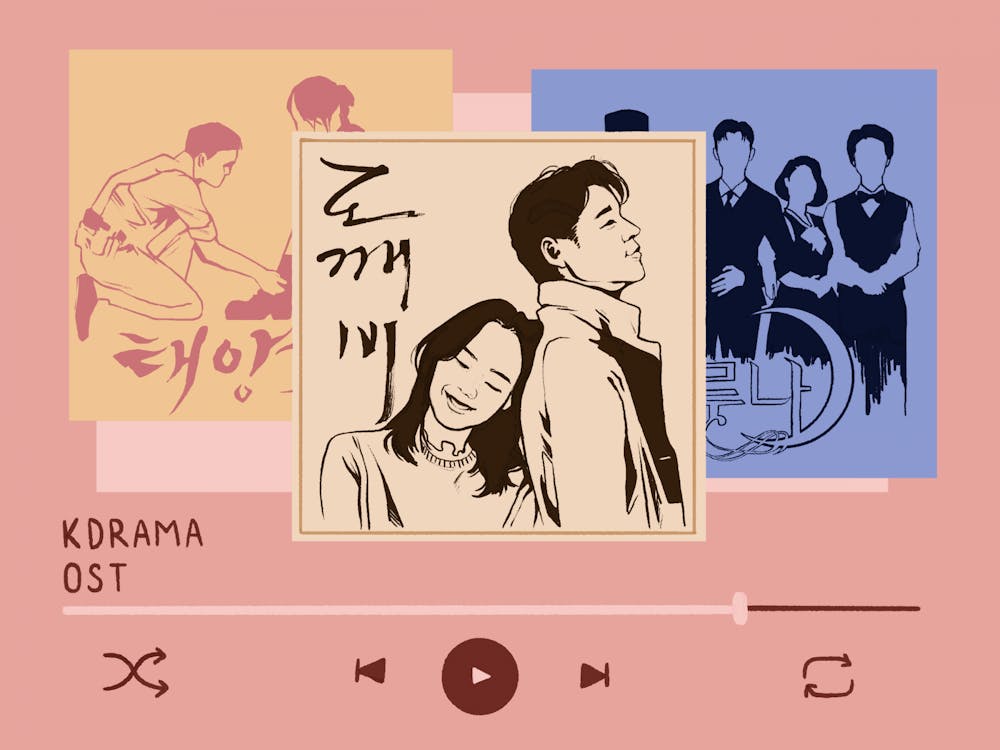One of the best ways to escape reality and cure boredom during this tumultuous quarantine is binging K– dramas. From whirlwind romances to dreadful horrors, you could plunge into a high school Cinderella story or breathe a sigh of relief that at least our world isn’t filled with supernatural monsters. You may have heard of them even if you are not familiar with Korean culture—some of them have gained international fame, especially in Asia, but also in the United States. Although K–dramas may be a challenge to watch for some viewers who don’t know the Korean language, the universal language of music that these dramas feature has helped push them to further international fame.
These original soundtracks (OSTs) are a beast of their own, with many tracks reminiscent of modern K–pop songs that could be enjoyed independently of the drama. Watching the dramas first gives the soundtracks special meaning—but even without watching the show, you can enjoy them on their own. Here are some of my favorite OST goldmines from recent popular K–dramas.
Goblin
Goblin is a tragic romance about a tortured immortal and an orphan girl with big dreams. It takes place in winter, and the soundtrack is appropriately half cozy and half cold. “Heaven” by Roy Kim and EZ, an example of the former, feels like a warm cup of sweet tea. It uses the harmonica and soft acoustics that were used in many old, nostalgic Korean ballads (similar to the nostalgia Queen brings) which may be why it feels like a cozy hug. The lyrics are endearingly cheesy and manage to be touching, especially in the context of the drama. “Stay With Me” by Punch and Chanyeol, a member of EXO (one of the most famous K–pop boy groups) is an example of the latter. It feels like two star–crossed lovers caught in a blizzard, asking each other to stay. As expected, the soundtrack performed very well commercially: at least ten tracks were within top 50 on major Korean charts.
Hotel Del Luna
Hotel Del Luna is a heart–wrenching romance between the manager of a hotel for tortured souls and the owner, who was the first tortured soul to arrive there. Its OST sets this K–drama apart, besides its set and costume design. It features Korean vocal geniuses like Punch, Taeyeon, Gummy, 10CM, and even the K–pop girl group Red Velvet.
Because it’s a (spoiler alert) fairly tragic romance, the music is aptly sad as well. Taeyeon’s “All About You” uses just a single voice and piano to create music you could play for a quiet crying session. The nuanced dynamics are soft yet passionate, just like the yearning that the leads feel for each other. It's simple yet incredibly sweet, as are many sad K–drama OSTs. On the other side, “Done For Me” by Punch uses echoing sound effects and a haunting yet velvety voice to form an empty feeling devoid of hope—timeless and trapped like cursed souls. These two singles, along with two others, peaked at #1 in Korea. All tracks charted within the top 50.
Descendants of the Sun
Now if you’re tired of romances, don’t worry—here’s another one. Descendants of the Sun is a whirlwind love story between the Korean equivalent of a green beret and an accomplished and ambitious doctor. There are several of the classic Korean ballads of yearning, and there are also some bright and happy romantic songs. “You Are My Everything” by Gummy features tight yet intense vibrato that drips with passion. On the other hand, “Everytime” by Punch and Chen, another member of EXO, sounds like a happy fairytale . Both rose to fame thanks to the clean and powerful vocals, and unsurprisingly, this soundtrack dominated the Korean music charts at its time of release. It is a classic K–drama OST to return to every once in a while.
K–dramas began as cheesy soap operas to keep Korean housewives company. Eventually they became a lucrative and popular industry, riding on the Hallyu wave of K–pop and making sure it is entertaining, especially with skillful writing and beautiful OSTs. Over time, music has come to play a bigger and bigger role in K–dramas, becoming an inseparable part of the true K–drama experience. Even if K–dramas are not your thing—maybe you just don’t like the writing style or the fact that it’s in a different language—their OSTs might be.

